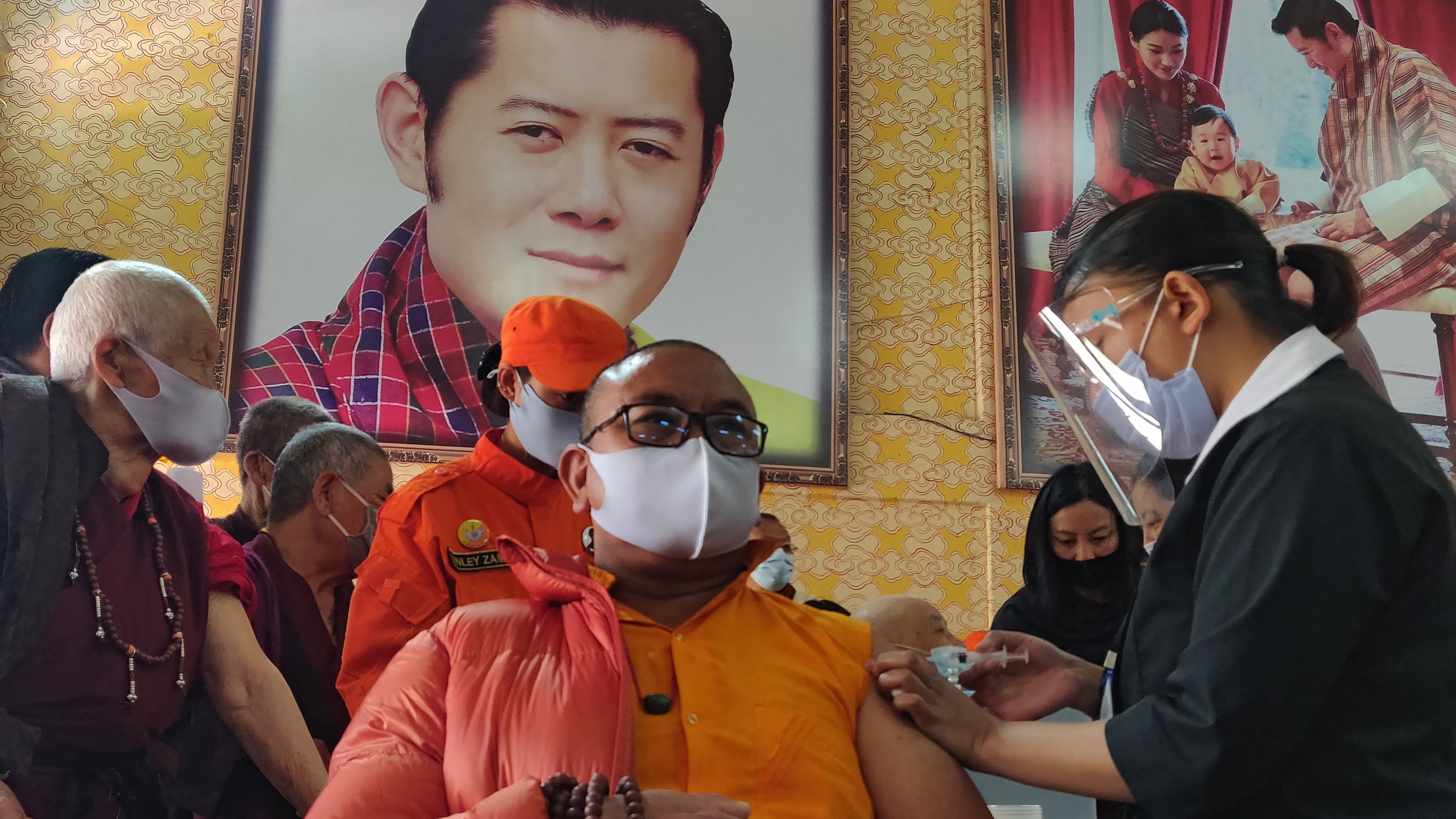How hiking health workers made Bhutan a vaccine world leader
Army of volunteers inoculate more than half of population in just seven days

As international vaccine campaigns gain pace, the risk of the world’s smaller and poorer countries being left behind remains a major concern.
But those fears have proved unfounded in the Himalayan country of Bhutan, where an already impressive pandemic response has been followed by a speedy Covid jabs rollout.
Perhaps best known until now for pioneering the concept of the “national happiness index”, Bhutan is gaining renown among health experts for a world-leading inoculation campaign that has seen just under 500,000 coronavirus vaccine doses administered to the country’s 763,000-strong population, according to latest Oxford University tracking.
The Week
Escape your echo chamber. Get the facts behind the news, plus analysis from multiple perspectives.

Sign up for The Week's Free Newsletters
From our morning news briefing to a weekly Good News Newsletter, get the best of The Week delivered directly to your inbox.
From our morning news briefing to a weekly Good News Newsletter, get the best of The Week delivered directly to your inbox.
That equates to a vaccination rate of more than 62 doses per 100 people - the sixth highest in the world.
Bhutan was given 150,000 doses of the Oxford-AstraZeneca vaccine by the Indian government in January, but rather than rushing ahead with the rollout, the leaders of the Buddhist nation “decided to consult the stars” in order to build public trust in the vaccines, ABC News reports.
Monks told the government that “the most auspicious time to begin the inoculation drive was late March” and that a woman “born in the Year of the Monkey” should be the first recipient, the Australian broadcaster continues.
The “chosen one” was 30-year-old Ninda Dema, who on 27 March became the first person in Bhutan to get a Covid jab, administered by a nurse also born in the Year of the Monkey at the astrologically important time of 9:30am.
A free daily email with the biggest news stories of the day – and the best features from TheWeek.com
The campaign quickly gathered momentum following the delivery of a further 450,000 doses from New Delhi, and was led by “dedicated citizen volunteers, known as ‘desuups’”, The Telegraph says.
Backed up by “robust public healthcare planning”, the desuups took responsibility for delivering vaccines and making sure citizens attended appointments and were up to speed about measures such as social distancing and hand washing, the paper adds. Indeed, “their role has been invaluable in a country that had only 37 doctors and barely 3,000 full-time healthcare workers before the pandemic”.
Admittedly, having a population roughly equivalent to that of San Francisco “makes a swift vaccine rollout more achievable”, says ABC News. But the landlocked nation faced other “challenges to reach people in remote mountain villages and low-lying valleys”.
The head of Lunana, one of the most remote villages in the northern Gasa district, told The New York Times (NYT) that helicopters have played a vital role in getting jabs to all areas of the country. “If there hadn’t been a chopper, getting the vaccines would have been an issue, since there’s no access road,” said village chief Kaka, who goes by only one name.
Health workers also hiked “from village to village through snow and ice” to deliver vaccinations, the paper reports, with “the vast majority” of doses “administered at about 1,200 vaccination centres over a week-long period” in late March and early April.
The speedy jabs delivery is part of a successful Covid response that has seen Bhutan reporting fewer than 1,000 coronavirus infections and only one death, according to data from John Hopkins University.
The Atlantic reports that the authorities have been issuing “clear, concise daily updates” about the pandemic since March 2020, when mandatory isolation in free accommodation and with free meals was also introduced for anyone suspected of being exposed to the virus.
In addition, Bhutan “barred tourists, closed schools and public institutions, shut gyms and movie theatres, began flexible working hours, and relentlessly called for face masks, hand hygiene, and physical distancing”, the magazine continues.
While many Western countries were still devising their pandemic response, Bhutan also launched a testing and tracing programme with a self-developed contact-tracing app and a public health campaign featuring “influencers such as actors, visual artists, bloggers, and sports personalities”.
As Bhutan now speeds ahead with the jabs rollout, Health Minister Dasho Dechen Wangmo told the NYT that “minor logistic issues were faced during the vaccination but were all manageable”.
The success of his country’s Covid response was also attributable in part to the “leadership and guidance” of Bhutan’s King Jigme Khesar Namgyel Wangchuck, the minister added.
Joe Evans is the world news editor at TheWeek.co.uk. He joined the team in 2019 and held roles including deputy news editor and acting news editor before moving into his current position in early 2021. He is a regular panellist on The Week Unwrapped podcast, discussing politics and foreign affairs.
Before joining The Week, he worked as a freelance journalist covering the UK and Ireland for German newspapers and magazines. A series of features on Brexit and the Irish border got him nominated for the Hostwriter Prize in 2019. Prior to settling down in London, he lived and worked in Cambodia, where he ran communications for a non-governmental organisation and worked as a journalist covering Southeast Asia. He has a master’s degree in journalism from City, University of London, and before that studied English Literature at the University of Manchester.
-
 Woolf Works: the Royal Ballet’s ‘inspired’ production’
Woolf Works: the Royal Ballet’s ‘inspired’ production’The Week Recommends Wayne McGregor’s three-act show brings Virginia Woolf’s creative world ‘vividly’ to life
-
 The 8 best biopic movies of the 21st century (so far!)
The 8 best biopic movies of the 21st century (so far!)the week recommends Not all true stories are feel good tales, but the best biopics offer insight into broader social and political trends
-
 Washington grapples with ICE’s growing footprint — and future
Washington grapples with ICE’s growing footprint — and futureTALKING POINTS The deadly provocations of federal officers in Minnesota have put ICE back in the national spotlight
-
 Trump HHS slashes advised child vaccinations
Trump HHS slashes advised child vaccinationsSpeed Read In a widely condemned move, the CDC will now recommend that children get vaccinated against 11 communicable diseases, not 17
-
 A fentanyl vaccine may be on the horizon
A fentanyl vaccine may be on the horizonUnder the radar Taking a serious jab at the opioid epidemic
-
 Health: Will Kennedy dismantle U.S. immunization policy?
Health: Will Kennedy dismantle U.S. immunization policy?Feature ‘America’s vaccine playbook is being rewritten by people who don’t believe in them’
-
 How dangerous is the ‘K’ strain super-flu?
How dangerous is the ‘K’ strain super-flu?The Explainer Surge in cases of new variant H3N2 flu in UK and around the world
-
 Vaccine critic quietly named CDC’s No. 2 official
Vaccine critic quietly named CDC’s No. 2 officialSpeed Read Dr. Ralph Abraham joins another prominent vaccine critic, HHS Secretary Robert F. Kennedy Jr.
-
 This flu season could be worse than usual
This flu season could be worse than usualIn the spotlight A new subvariant is infecting several countries
-
 Covid-19 mRNA vaccines could help fight cancer
Covid-19 mRNA vaccines could help fight cancerUnder the radar They boost the immune system
-
 The new Stratus Covid strain – and why it’s on the rise
The new Stratus Covid strain – and why it’s on the riseThe Explainer ‘No evidence’ new variant is more dangerous or that vaccines won’t work against it, say UK health experts